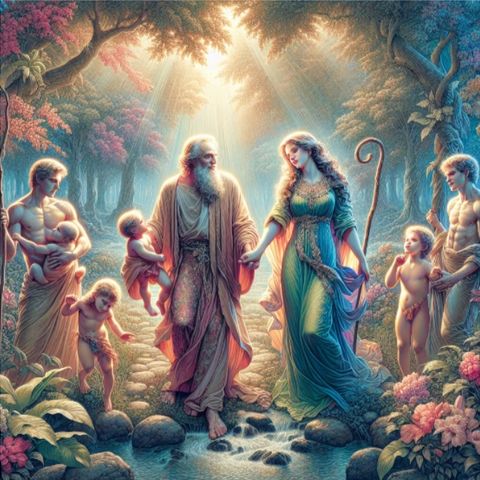The Birth Of Cain And Abel Discussion

Sign up for free
Listen to this episode and many more. Enjoy the best podcasts on Spreaker!
Download and listen anywhere
Download your favorite episodes and enjoy them, wherever you are! Sign up or log in now to access offline listening.
The Birth Of Cain And Abel Discussion
This is an automatically generated transcript. Please note that complete accuracy is not guaranteed.
Description
In Genesis 3 we have the root of sin and in Genesis 4 the fruit of sin. How bad is sin? Well, in this chapter, we find that man was...
show moreHow bad is sin?
Well, in this chapter, we find that man was not just suffering from ptomaine poisoning because of having eaten the fruit of the tree of knowledge of good and evil. Ptomaine poisoning nowadays is much more commonly known by the generic term of food poisoning.
Chapter 4 reveals how much had really happened to the man. By his disbelief and his disobedience, he had turned away from God and had sinned in such a way that he brought upon himself and his race His judgment, because you and I are given this same kind of nature.
We have the same nature that our father had, and Adam has given all of us a pretty bad nature. All this is revealed in the story of the two sons of Adam and Eve. They had more children than this, but we are given the record of only these two at this time.
Genesis 4:1–16 tells the beginning of human history in the wake of Adam's and Eve's sin and separation from God. This passage details the murder of Abel by his older brother Cain, the first son of Adam and Eve.
Cain and Abel work the ground and tend sheep. They worship God, but Cain kills Abel in a fit of envy over God's rejection of Cain and his offering. The first human born on earth becomes the first murderer.
God forces Cain to leave his family and wander the earth, but God also marks Cain with a promise of great vengeance on anyone who would kill him.
The consequences of sin become apparent in chapter 4: envy, arrogance, rebellion, murder, punishment, separation from family, and separation from God. Adam and Eve's firstborn son, Cain, jealously murders his brother Abel and loses everything. Adam and Eve lose them both.
Cain's descendants amplify his sinfulness. Still, God provides help for Eve in childbirth and even provides protection for Cain in his wandering.
Eve remains a woman of faith, even in her loss. And the sons of Seth, born after the murder of Abel, become a people who proclaim the name of the Lord.
Our Scripture Of The Week Is:
Genesis 4:7 KJV
[7] If thou doest well, shalt thou not be accepted? and if thou doest not well, sin lieth at the door. And unto thee shall be his desire, and thou shalt rule over him.
In the previous verse, God asked Cain why he felt so much anger when God rejected his offering.
God had shown favor on his brother Abel and his offering, which seems to have enraged Adam and Eve's firstborn son.
God now speaks a wise warning to Cain. Cain will not heed it, but it is a warning for us as well. God asks Cain to adjust his understanding of what is good to God's understanding of goodness. If Cain does well by God's standard, God will accept him.
In other words, there is no reason for Cain to be angry about God's rejection. The cure for that rejection is obedience: if Cain does what is right, God will accept him.
If Cain insists on setting his own standards for what is acceptable, sin "is crouching at the door." That poetic phrase captures the nature of our rebellion against God. Sin desires to own us, and our refusal to let God set the standard for right and wrong in our lives is the fast track to sin.
God acknowledges the reality of human nature. We are locked in a battle with sin's desire for us (or our desire to sin).
God tells Cain he is responsible to win that battle, to rule over his sin. The Hebrew terms used in this verse are exactly the same ones spoken to Eve in Genesis 3:16.
These are from the root words tashuwqah, translated "desire," and mashal, translated "rule over."
Despite sin's "desire" for control over him, Cain must "rule over" his temptations and not give in.
Information
| Author | Jerry M. Joyce |
| Organization | Jerry Joyce |
| Website | - |
| Tags |
Copyright 2024 - Spreaker Inc. an iHeartMedia Company
